Related Research Articles

The Ossewabrandwag (OB) was an Afrikaner nationalist organization with strong ties to national socialism, founded in South Africa in Bloemfontein on 4 February 1939. The organization was strongly opposed to South African participation in World War II, and vocally supportive of Nazi Germany. OB carried out a campaign of sabotage against state infrastructure, resulting in a government crackdown. The unpopularity of that crackdown has been proposed as a contributing factor to the victory of the National Party in the 1948 South African general election and the rise of Apartheid.

Television in South Africa was introduced in 1976. The country is notable for the late introduction of widespread television broadcasting.
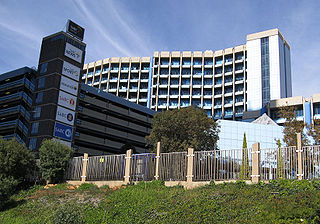
The South African Broadcasting Corporation (SABC) is the public broadcaster in South Africa, and provides 19 radio stations (AM/FM) as well as six television broadcasts to the general public. It is one of the largest of South Africa's state-owned enterprises.
The Afrikaner Broederbond (AB) or simply the Broederbond was an exclusively Afrikaner Calvinist and male secret society in South Africa dedicated to the advancement of the Afrikaner people. It was founded by H. J. Klopper, H. W. van der Merwe, D. H. C. du Plessis and the Rev. Jozua Naudé in 1918 as Jong Zuid Afrika until 1920, when it was renamed the Broederbond. Its influence within South African political and social life came to a climax with the 1948-1994 rule of the white supremacist National Party and its policy of apartheid, which was largely developed and implemented by Broederbond members. Between 1948 and 1994, many prominent figures of Afrikaner political, cultural, and religious life, including every leader of the South African government, were members of the Afrikaner Broederbond.

Christiaan Frederick Beyers Naudé was a South African Afrikaner Calvinist Dominee, theologian and the leading Afrikaner anti-apartheid activist. He was known simply as Beyers Naudé, or more colloquially, Oom Bey.

Orkney is a gold mining town situated in the Klerksdorp district of the North West province, South Africa. It lies on the banks of the Vaal River approximately 180 km from Johannesburg near the N12.

Afrikaner nationalism is a nationalistic political ideology created by Afrikaners residing in Southern Africa during the Victorian era. The ideology was developed in response to the significant events in Afrikaner history such as the Great Trek, the First and Second Boer Wars and the resulting anti-British sentiment that developed among Afrikaners and opposition to South Africa's entry into World War I.
Gerrit Van Niekerk Viljoen was a South African government minister and member of the National Party.
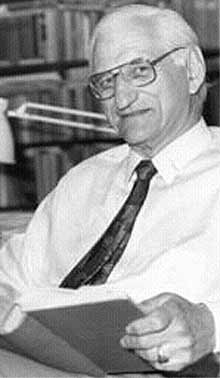
Johan Adam Heyns (1928–1994) was an Afrikaner Calvinist theologian and moderator of the general synod of the Nederduits Gereformeerde Kerk (NGK) in South Africa. He was assassinated at his home in Waterkloof Ridge, Pretoria.
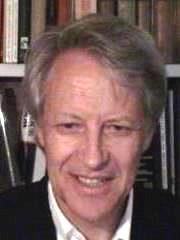
Daniel Francois Roodt is a South African author, publisher, and commentator.
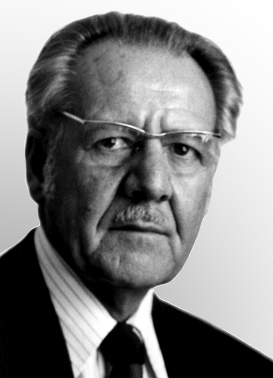
Albertus (Albert) Stephanus Geyser was a South African cleric, scholar and anti-apartheid theologian. Geyser became an outcast in the white Afrikaner community because of his theological opposition to apartheid and to the Broederbond, the secret male Calvinist organisation that covertly steered South African politics during the apartheid era. He obtained master's and doctoral degrees cum laude, specializing in Greek and Latin. At the age of 27 he was appointed lecturer, and a year later, professor in the Theological Faculty of the Nederduitsch Hervormde Kerk at the University of Pretoria. Geyser contributed to the first annotated edition (1953–1958) of the Bible in Afrikaans, founded the Christian Institute, and was the first South African to be elected as a member of Studiorum Novi Testamenti Societas.

Hoërskool Voortrekker is a public Afrikaans medium co-educational high school situated in the municipality of Boksburg in the city of Ekurhuleni in the Gauteng province of South Africa. The academic school was established in 1920.

Adriaan Nicolaas Petrus Pelzer was a South African Afrikaans academic, historian, author and Professor at the University of Pretoria, South Africa. He retired from the University of Pretoria as vice rector and acting rector in 1980. Among the books he published are the following "The Afrikaner-Broederbond: First 50 Years (1980)" and "Verwoerd Speaks: Speeches 1948–1966 (1966)". He was also member of the "National Monuments Council" and in 1978 received the Laureate Award from the University of Pretoria. The Laureate Award is the highest award granted by the University of Pretoria. From 1965 to 1978 he was vice president and a member of the executive committee of the Northern-Transvaal Rugby Union, and a life member from 1979.
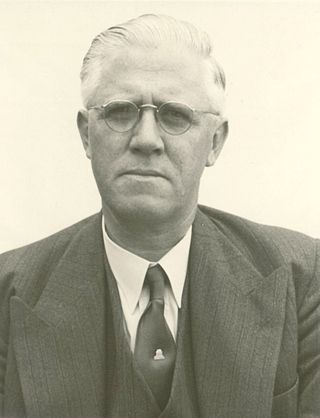
Pierre de Villiers Pienaar (1904–1978) was a South African Afrikaans academic and Professor at University of the Witwatersrand (Wits) and later at University of Pretoria, who pioneered Speech Language Therapy in South Africa and specialising in Audiology and Lexicography as well as being an Afrikaans author. As Lexicographer in 1973, he was part of the group of authors that established the Afrikaans Explanatory Dictionary alongside Prof M.S.B. Kritzinger and Prof F.J. Labuschagne.

Anton Carlisle Hartman (1918–1982) was a South African conductor. He was head of music and principal conductor at the South African Broadcasting Corporation (SABC) and head of music at the University of the Witwatersrand. He became a central figure in art music in South Africa during the mid 20th century.
Johannes Cornelis (Joon) van Rooy was Rector of the Potchefstroom University for Christian Higher Education and Chairman of the Afrikaner Broederbond.
Henning Johannes Klopper (1895–1985) was a South African politician who served as Speaker of the National Assembly, and the first chairman of the Afrikaner Broederbond. He is known for promoting Afrikaans and fighting White Afrikaner poverty in South Africa.
Johan Hendrik Greijbe was an Afrikaans educationist and chairman of the Afrikaner Broederbond.
Jan Pieter de Lange was a South African educationalist, chairman of the Afrikaner Broederbond, and a negotiator.
Jozua Francois Naudé was a South African pastor, school founder and co-founder of the Afrikaner Broederbond.
References
- 1 2 3 4 5 Prinsloo, D. (1 May 1987). "Dr Piet Meyer in Johannesburg, 1936-1984" (PDF). Historia. 32 (1). University of South Africa: 44–54. Retrieved 29 August 2018.
- ↑ (Afrikaans) Nog nie ver genoeg nie (translated:not far enough). Perskor. 1984. ISBN 9780628024275.
- ↑ "Media Mense" . Retrieved 29 August 2018.
- ↑ "Afrikaner Broederbond (AB)". Nelson Mandela Centre of Memory. Retrieved 29 August 2018.
- ↑ Marx, Christoph (2008). Oxwagon Sentinel: Radical Afrikaner Nationalism and the History of the 'Ossewabrandwag'. LIT Verlag Münster. p. 426. ISBN 978-3-8258-9797-0.
- ↑ Moodie, D.T. (1980). The rise of the Afrikanerdom. University of California Press. ISBN 978-0-520-03943-8.
the rise of the afrikanerdom.
- ↑ Klee, J.N. (May 2017). "Establishing of Rand Afrikaans University 1955-1975" (PDF). North=West University. Retrieved 29 August 2018.
- ↑ "Today in history". SAHO. 2011-03-16. Retrieved 29 August 2018.
- ↑ Silke, D. (August 1989). "The broadcasting of politics in South Africa" (PDF). University of Cape Town. Retrieved 30 August 2018.
- ↑ O’Meara, D. (January 1978). "Analysing Afrikaner Nationalism: The 'Christian-National' Assault on White Trade Unionism in South Africa, 1934-1948". African Affairs. 77 (306). Oxford University Press: 45–72. doi:10.1093/oxfordjournals.afraf.a096954. JSTOR 721347.
- ↑ "Afrikaner anti-communist history production in South". Nanopdf.com. 3 May 2018. Retrieved 29 August 2018.
- ↑ "Broederbond in Afrikaner Politics" . Retrieved 29 August 2018.
- ↑ "Pieter Johannes Meyer".
- ↑ "Static as channels change at SABC". Mail &Guardian newspaper. 17 November 1985. Retrieved 29 August 2018.